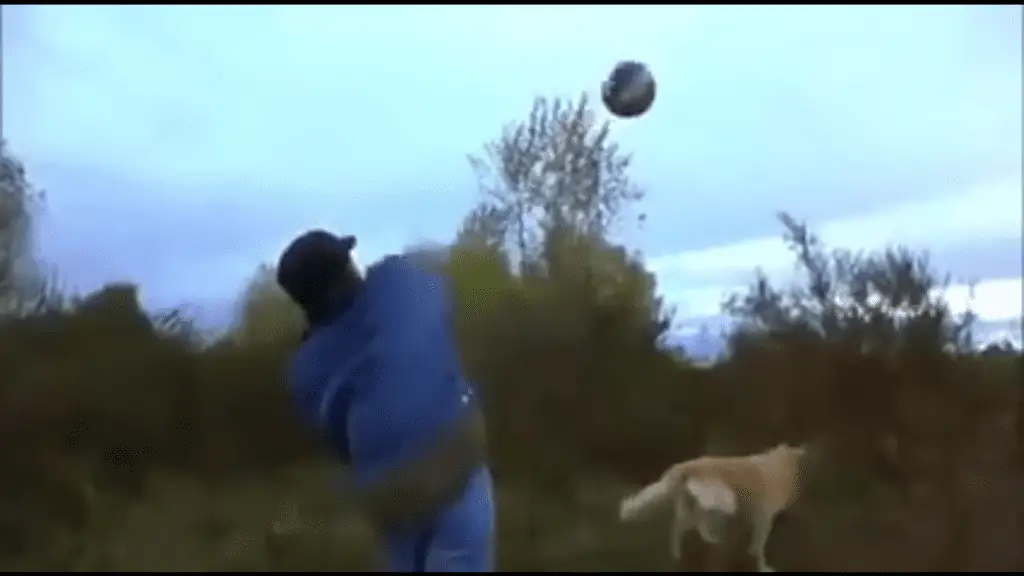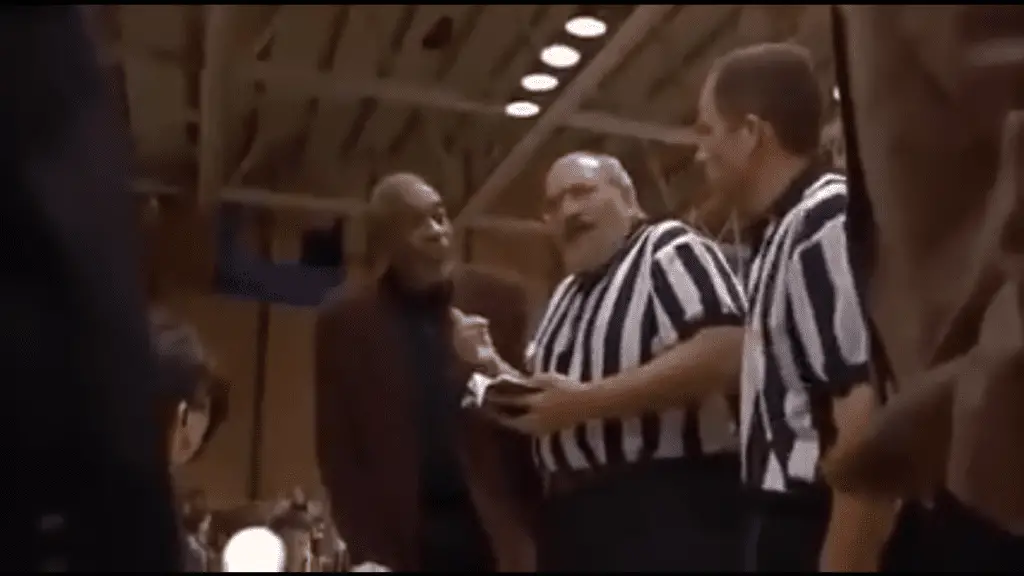Disney’s Air Bud, capitalizing on the power of nostalgia and its bizarre premise, has enjoyed a resurgence in the cultural zeitgeist the last few years. Despite most of this resurgence taking place in the forms of memes, it should be noted that Air Bud manages to be both an ironic and unironically great movie. Τhe franchise was sacrificed to capitalist greed with endless sequels and spinoffs makes the point of unironic enjoyment harder to argue, true, but if we focus only on the first film specifically the merit is far clearer than how much fun it is to watch a dog play basketball.
The ironic enjoyment of Air Bud is understandable. It has long had meme-status and even people that don’t watch it with nostalgia goggles or who have never seen it at all are more than ready to have a laugh over the premise of, “There’s a dog. He plays basketball.” It really is a cross-section of contemporary kid’s media. Basketball featured in plots of 90s films like Space Jam, Like Mike, and half a dozen Disney Channel Original Movies. Boy-and-his-dog movies like Shiloh, My Dog Skip, and Homeward Bound were all the rage, too. A movie that combined the two had no choice but to succeed, and spawn 11 follow-ups.
But there are genuine themes in the first film that get drowned out by the silly premise and dropped from sequels where the dog can play any old sport. The movie deals with grief, depression, and abuse thoughtfully, even with the backdrop of the dog getting a little pair of athletic shoes. Pulling off that balance continues to be impressive.
Air Bud was released in 1997 by Walt Disney Pictures and Keystone Entertainment to mixed reviews and earned $27 million in the box office, a success considering its $3 million budget. The film stars a golden retriever, Buddy, already a seasoned actor from his work as Comet on the family sitcom Full House. Human actors featured in the film include Kevin Zegers, Wendy Makkena, Michael Jeter, and Bill Cobbs. It is also, notably, the only film in the franchise to earn a PG rating due to its subject matter detailing animal cruelty, depression, mild language, and one scene involving child abuse.
The film is set in the fictional town of Fernfield, Washington. Key locations include Norm Snively’s rundown home, the Framm family’s home in a neighborhood with notably higher socioeconomic value, the abandoned church’s outdoor basketball court, and the middle school where Josh attends. It is set at the beginning of the school year in (presumably) 1997 and narratively passes through Christmas into early spring.
Air Bud opens on Norm Snively, a birthday clown and the original owner of Buddy. After a failed party, Norm angrily asserts that he will be taking Buddy to the pound, driving so carelessly that Buddy’s kennel falls off the back of the truck and into the street.

The main character, Josh, moved to Fernfield with his mother and sister after the death of his father. Josh is not adjusting well at school and though he used to enjoy playing basketball with his father, his depression keeps him from actually trying out for the team, becoming the towel boy instead. While walking home he discovers an abandoned church with an adjacent outdoor basketball court, which is where he discovers Buddy, hungry and ragged in the bushes. Josh takes him home and convinces his mother to let him keep Buddy. In the meantime, Josh has discovered Buddy’s ability to shoot a basket with his nose.
Josh, through a series of unusually lucky events for him, also manages to join the basketball team. Buddy becomes an official mascot of the team, with his halftime basketball tricks landing him on the local news where Norm Snively recognizes him and demands the return of his dog. The day of the championship game, Josh smuggles Buddy from Snively’s home and sets him loose. It is the emotional height of the movie, reminiscent of White Fang and the pain of separation for someone’s own good.

Buddy, ever loyal, returns to save the game when the team is low on players. Due to many convenient loopholes, famously about the rules not outright saying that a dog cannot play basketball, Buddy is allowed to play.

They win, but Snively returns and declares he will see the Framms in court. The judge declares that Buddy will choose his owner for himself, being placed between both Josh and Snively. Snively brandishes a rolled-up newspaper that he’d abused Buddy with in the past and before choosing Josh, Buddy tears up the newspaper. Josh is then awarded custody while Snively is arrested for animal cruelty.
That’s the basic outline of the 99-minute film, but let’s look a little closer at what’s happening thematically. Josh Framm is a 12-year-old boy reeling from the recent loss of his father and his family’s subsequent move to Fernfield. He displays clear signs of depression such as lethargy, loss of appetite, and limited use of speech. He is notably silent for many of his early scenes. He finds an outdoor basketball court behind an abandoned church where he goes after school and discovers Buddy, who is instrumental in their mutual recovery.
Norm Snively is the film’s primary antagonist, the character who opens the film and is notably unambiguous about his abuse of Buddy. He is a birthday clown by profession and declares on multiple occasions that he hates his livelihood. However, he does display a certain level of pride when introducing himself to characters from whom he needs things, such as his first interaction with Jackie Framm or with the judge. His name is a wonderful example of how nothing is chosen without cause when creating any form of media, as the name itself is very indicative of his character. Air Bud opens and closes with examples of Norm Snively’s abusive behavior. It opens with his smacks and threats to Buddy after a failed birthday party and closes with his threats and brandishing of newspaper outside the courthouse.
The film, featuring a dog protagonist (though he, thankfully, doesn’t talk), a young boy in a coming-of-age setting, and a stylistically overwrought villain is presented as a children’s film, especially considering it is a member of the Walt Disney canon. It has an optimistic ending and a very Disney-esque off-screen parent death just prior to the start of the film. However, it also has some distinct dark tones that play away from its presented style, such as the plot-relevant animal cruelty, depression, and child abuse. The style of the film is presented not to shy away from these topics, while also maintaining its optimistic light-hearted tone.
As mentioned, abuse is a theme that is threaded throughout the narrative, most visibly with Buddy’s abuse at the hands of Norm Snively, but also given focus in an very impactful scene about 2/3 through the film. One of the boys is being repeatedly pelted by basketballs thrown by his coach for having dropped a pass during the game. This theme is handled very respectfully throughout the film, and also in a very age-sensitive manner. Both instances of abuse are treated as inexcusable by the narrative, and both are also swiftly punished upon exposure.
There is also a prevalent theme of teamwork and of encouraging asking for help. The basketball team performs better when they communicate, Josh’s depression is less detrimental due to his interactions with Buddy and the team, and Arthur Cheney’s past ghosts are swept aside through helping the younger boys by being their coach. Jackie Framm is also given thematic significance in her adaptability, first unwilling to take on the responsibility of Buddy and later supporting keeping him because of his positive impact on Josh. She is also displayed as adaptable given her first cowing by Norm Snively’s legal ownership of Buddy, and later her refusal to accept such as appropriate given Buddy’s evident reactions to Snively.
All of this, in a movie about a dog playing basketball.
Images courtesy of Walt Disney Pictures.

